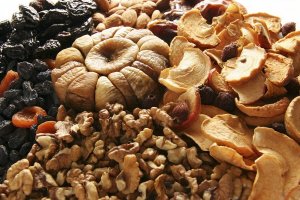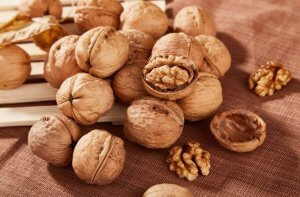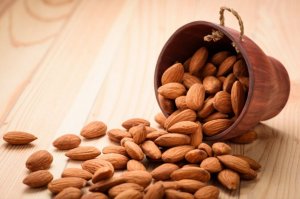Benefits of Seeds and Nuts

Eating seeds and nuts can improve your quality of life! They can help you to stay young, prevent diseases and nourish your body. In this article, we’ll explain the important reasons why it’s convenient to add them to your daily diet.
Seeds and nuts are consumed around the world. Of course, they have individual names. Still, even when they taste and look very different, they are grouped under the name “nuts”. As a general rule, nuts contain less than 50 percent of water.
Peanuts, almonds, walnuts, pine nuts, hazelnuts, and chestnuts, among others, all have different properties that make them a great food to add to your snacks. Keep reading to find out what they are!
Benefits of seeds and nuts
1. They have antioxidant qualities
Nuts are an excellent source of antioxidants. If you don’t consume types such as almonds and pistachios, it’s time to include them in your diet and start enjoying their benefits.
The antioxidants present in nuts have the ability to combat oxidative stress by neutralizing free radicals. This actually diminishes cell damage and prevents diseases.
In this sense, antioxidants present in nuts help us to stay younger because they delay aging. In the same way, they can reduce the risk of developing cardiovascular and neurodegenerative diseases.

2. Seeds and nuts have many nutrients
Although it may not seem the case, both seeds and nuts have diverse and essential nutrients. These nutrients are vital to the body. While the amount of these nutrients varies, they all contain the following elements:
- Proteins
- Vitamin E
- Fiber
- Magnesium
- Manganese
- Selenium
- Copper
- Carbohydrates
Most seeds and nuts have a high amount of what’s sometimes referred to as ‘good carbs’. These carbohydrates will actually help you to reduce weight while keeping your body healthy.
3. Diminish inflammation
Inflammation is the way in which the body defends itself from injuries, bacteria and other potentially harmful pathogens. However, chronic inflammation can cause organ damage and increase the risks of long-term illnesses.
Some research suggests that eating nuts can reduce inflammation and promote healthy aging. A study on the Mediterranean diet found that people who consumed walnuts experienced a decrease of between 35 and 90 percent in the inflammatory indexes.
Similarly, it has been found that some nuts, such as pistachios, Brazil nuts, walnuts, and almonds, fight inflammation in both healthy people and patients suffering severe illnesses such as different types of diabetes or kidney problems.
You might also like: Can You Eat Peanuts to Avoid Anxiety?
4. Reduce cholesterol and triglycerides
Nuts have impressive effects on cholesterol and triglyceride levels too. The way seeds and nuts are able to reduce cholesterol levels can be due to their high content of monounsaturated and polyunsaturated fatty acids.
Almonds and hazelnuts appear to raise ‘good’ HDL cholesterol while lowering total and ‘bad’ LDL cholesterol. Also, several studies have found that ground, chopped or whole hazelnuts had similar beneficial effects on cholesterol levels.
According to experts in the field, one study revealed that by eating 30 grams of mixed nuts per day, for 6 weeks, significantly reduced all types of cholesterol, except for ‘good’ HDL.

5. Seeds and nuts have a high amount of fiber
Fiber provides many benefits to health. Although the body cannot digest it, the bacteria that live in the colon can.
Many types of fiber work as probiotics for healthy intestinal bacteria. Then, intestinal bacteria ferment the fiber and convert it into beneficial short-chain fatty acids (SCFAs).
That’s why SCFAs can improve intestinal health and reduce the risk of diabetes and obesity. In addition, fiber provides satiety and reduces the number of calories absorbed from meals.
Seeds and nuts are simple foods, which can be eaten from time to time. However, you will enjoy wonderful benefits if you decide to include them more frequently in your diet. You can even eat them as a substitute for processed goodies.
For example, you can eat nuts as snacks, to accompany various recipes or to make smoothies, among other options to enjoy their flavor and nourish your body. Don’t hesitate! Next time you’re shopping at the store, buy more seeds and nuts and enjoy all of the benefits.
Eating seeds and nuts can improve your quality of life! They can help you to stay young, prevent diseases and nourish your body. In this article, we’ll explain the important reasons why it’s convenient to add them to your daily diet.
Seeds and nuts are consumed around the world. Of course, they have individual names. Still, even when they taste and look very different, they are grouped under the name “nuts”. As a general rule, nuts contain less than 50 percent of water.
Peanuts, almonds, walnuts, pine nuts, hazelnuts, and chestnuts, among others, all have different properties that make them a great food to add to your snacks. Keep reading to find out what they are!
Benefits of seeds and nuts
1. They have antioxidant qualities
Nuts are an excellent source of antioxidants. If you don’t consume types such as almonds and pistachios, it’s time to include them in your diet and start enjoying their benefits.
The antioxidants present in nuts have the ability to combat oxidative stress by neutralizing free radicals. This actually diminishes cell damage and prevents diseases.
In this sense, antioxidants present in nuts help us to stay younger because they delay aging. In the same way, they can reduce the risk of developing cardiovascular and neurodegenerative diseases.

2. Seeds and nuts have many nutrients
Although it may not seem the case, both seeds and nuts have diverse and essential nutrients. These nutrients are vital to the body. While the amount of these nutrients varies, they all contain the following elements:
- Proteins
- Vitamin E
- Fiber
- Magnesium
- Manganese
- Selenium
- Copper
- Carbohydrates
Most seeds and nuts have a high amount of what’s sometimes referred to as ‘good carbs’. These carbohydrates will actually help you to reduce weight while keeping your body healthy.
3. Diminish inflammation
Inflammation is the way in which the body defends itself from injuries, bacteria and other potentially harmful pathogens. However, chronic inflammation can cause organ damage and increase the risks of long-term illnesses.
Some research suggests that eating nuts can reduce inflammation and promote healthy aging. A study on the Mediterranean diet found that people who consumed walnuts experienced a decrease of between 35 and 90 percent in the inflammatory indexes.
Similarly, it has been found that some nuts, such as pistachios, Brazil nuts, walnuts, and almonds, fight inflammation in both healthy people and patients suffering severe illnesses such as different types of diabetes or kidney problems.
You might also like: Can You Eat Peanuts to Avoid Anxiety?
4. Reduce cholesterol and triglycerides
Nuts have impressive effects on cholesterol and triglyceride levels too. The way seeds and nuts are able to reduce cholesterol levels can be due to their high content of monounsaturated and polyunsaturated fatty acids.
Almonds and hazelnuts appear to raise ‘good’ HDL cholesterol while lowering total and ‘bad’ LDL cholesterol. Also, several studies have found that ground, chopped or whole hazelnuts had similar beneficial effects on cholesterol levels.
According to experts in the field, one study revealed that by eating 30 grams of mixed nuts per day, for 6 weeks, significantly reduced all types of cholesterol, except for ‘good’ HDL.

5. Seeds and nuts have a high amount of fiber
Fiber provides many benefits to health. Although the body cannot digest it, the bacteria that live in the colon can.
Many types of fiber work as probiotics for healthy intestinal bacteria. Then, intestinal bacteria ferment the fiber and convert it into beneficial short-chain fatty acids (SCFAs).
That’s why SCFAs can improve intestinal health and reduce the risk of diabetes and obesity. In addition, fiber provides satiety and reduces the number of calories absorbed from meals.
Seeds and nuts are simple foods, which can be eaten from time to time. However, you will enjoy wonderful benefits if you decide to include them more frequently in your diet. You can even eat them as a substitute for processed goodies.
For example, you can eat nuts as snacks, to accompany various recipes or to make smoothies, among other options to enjoy their flavor and nourish your body. Don’t hesitate! Next time you’re shopping at the store, buy more seeds and nuts and enjoy all of the benefits.
All cited sources were thoroughly reviewed by our team to ensure their quality, reliability, currency, and validity. The bibliography of this article was considered reliable and of academic or scientific accuracy.
- Haddad, E. H., Gaban-Chong, N., Oda, K., & Sabaté, J. (2014). Effect of a walnut meal on postprandial oxidative stress and antioxidants in healthy individuals. Nutrition Journal, 13(1) https://doi.org/10.1186/1475-2891-13-4.
- Rahman, K. (2007). Studies on free radicals, antioxidants, and co-factors. Clinical Interventions in Aging. https://doi.org/http://dx.doi.org/
- Grosso, G., & Estruch, R. (2016, February 1). Nut consumption and age-related disease. Maturitas. Elsevier Ireland Ltd. https://doi.org/10.1016/j.maturitas.2015.10.014
- Damasceno, N. R. T., Sala-Vila, A., Cofán, M., Pérez-Heras, A. M., Fitó, M., Ruiz-Gutiérrez, V., … Ros, E. (2013). Mediterranean diet supplemented with nuts reduces waist circumference and shifts lipoprotein subfractions to a less atherogenic pattern in subjects at high cardiovascular risk. Atherosclerosis, 230(2), 347–353. https://doi.org/10.1016/j.atherosclerosis.2013.08.014
- Tey, S. L., Delahunty, C., Gray, A., Chisholm, A., & Brown, R. C. (2015). Effects of regular consumption of different forms of almonds and hazelnuts on acceptance and blood lipids. European Journal of Nutrition, 54(3), 483–487.
- Chiang, Y. L., Haddad, E., Rajaram, S., Shavlik, D., & Sabaté, J. (2012). The effect of dietary walnuts compared to fatty fish on eicosanoids, cytokines, soluble endothelial adhesion molecules and lymphocyte subsets: A randomized, controlled crossover trial. Prostaglandins Leukotrienes and Essential Fatty Acids, 87(4–5), 111–117.
- Bakhtyari, L., Vafaeimanesh, J., Khorramirad, A., Parham, M., Hozoori, M., Heidari, S., & Hosseinzadeh, F. (2014). Effects of Pistachio Nut Supplementation on Blood Glucose in Patients with Type 2 Diabetes: A Randomized Crossover Trial. The Review of Diabetic Studies, 11(2), 190–196.
- Stockler-Pinto, M. B., Mafra, D., Moraes, C., Lobo, J., Boaventura, G. T., Farage, N. E., … Malm, O. (2014). Brazil nut (Bertholletia excelsa, H.B.K.) improves oxidative stress and inflammation biomarkers in hemodialysis patients. Biological Trace Element Research, 158(1), 105–112.
- Stockler-Pinto, M. B., Mafra, D., Farage, N. E., Boaventura, G. T., & Cozzolino, S. M. F. (2010). Effect of Brazil nut supplementation on the blood levels of selenium and glutathione peroxidase in hemodialysis patients. Nutrition, 26(11–12), 1065–1069.
- Jamshed, H., Sultan, F. A. T., Iqbal, R., & Gilani, A. H. (2015). Dietary Almonds Increase Serum HDL Cholesterol in Coronary Artery Disease Patients in a Randomized Controlled Trial. The Journal of Nutrition, 145(10), 2287–2292. https://doi.org/10.3945/jn.114.207944
- Wu, L., Piotrowski, K., Rau, T., Waldmann, E., Broedl, U. C., Demmelmair, H., … Parhofer, K. G. (2014). Walnut-enriched diet reduces fasting non-hdl-cholesterol and apolipoprotein b in healthy caucasian subjects: A randomized controlled cross-over clinical trial. Metabolism: Clinical and Experimental, 63(3), 382–391.
This text is provided for informational purposes only and does not replace consultation with a professional. If in doubt, consult your specialist.








